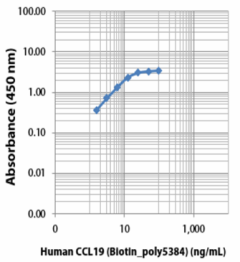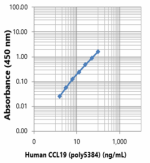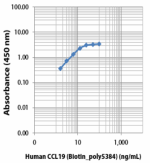- Clone
- Poly5384 (See other available formats)
- Regulatory Status
- RUO
- Other Names
- EBI1 ligand chemokine, ELC, macrophage inflammatory protein-3-beta
- Isotype
- Goat Polyclonal IgG
- Ave. Rating
- Submit a Review
- Product Citations
- publications

-

Direct ELISA showing biotin anti-human CCL19 (clone Poly5384) bound to plate-immobilized recombinant human CCL19 (MIP-3β) protein (Cat. Nos. 582102, 582104, and 582106). The wells were incubated with serially diluted biotin primary antibody at room temperature for 2 hours in 1% BSA-PBS, followed by incubation with HRP Avidin (Cat. No. 405103). TMB substrate (Cat. No. 421501) was used for detection. Absorbance was measured at 450 nm.
| Cat # | Size | Price | Quantity Check Availability | Save | ||
|---|---|---|---|---|---|---|
| 538403 | 50 µg | 212€ | ||||
CCL19 is a CC chemokine expressed in lymph nodes. CCL19 is only 32% identical to CCL21 at the amino acid level; nevertheless, these chemokines bind to the same receptor, CCR7. CCL19 is not expressed in high endothelial venules (HEV) as CCL21, but CCL19 is transcytosed in HEV. It has been described that CCL19 binds to CCX-CKR and CRAM-B receptors. These two receptors are members of the non-classical chemokine receptor family, which also includes D6, DARC, and CXCR7. It has been suggested that CCX-CKR is a scavenging receptor for CCL19, and CRAM-B receptor might be responsible for the transcytosis in HEV for CCL19. In addition, CRAM recycles constitutively and can internalize CCL19 within a few minutes, suggesting it may play a role in the regulation of immune responses as well as homing processes.
Product DetailsProduct Details
- Verified Reactivity
- Human
- Antibody Type
- Polyclonal
- Immunogen
- Human Recombinant CCL19 Protein
- Formulation
- Phosphate-buffered solution, pH 7.2, containing 0.09% sodium azide
- Preparation
- The antibody was purified by affinity chromatography and conjugated with biotin under optimal conditions.
- Concentration
- 0.5 mg/mL
- Storage & Handling
- The antibody solution should be stored undiluted between 2°C and 8°C. Do not freeze.
- Application
-
Direct ELISA - Quality tested
- Recommended Usage
-
Each lot of this antibody is quality control tested by Direct ELISA. The optimal concentration of this reagent for the specific application and the experiment design should be established by the end-user.
- Additional Product Notes
-
This product is intended for sandwich-based immunoassay development on various assay platforms requiring antibody pairs. This antibody (clone Poly5384) could function as a detection antibody when paired with Ultra-LEAF™ purified anti-human CCL19 antibody (Cat Nos. 612803 and 612804) (clone A15093C) as the capture antibody and using Recombinant Human CCL19 (MIP-3β) protein (Cat. Nos. 582102, 582104, and 582106) as the assay standard.
- RRID
-
AB_3083212 (BioLegend Cat. No. 538403)
Antigen Details
- Structure
- Chemokine
- Distribution
-
CCL19 is expressed in the T cell zone of lymph nodes, in Peyer's patches by reticular cells, and in spleen by stromal cells. CCL19 is expressed by endothelial cells in lymphatic venules.
- Function
- CCL19 chemoattracts naïve T cells and maturing dendritic cells (DCs) into T zones of secondary lymphoid organs. CCL19 and CCL21 inhibit apoptosis in DCs.
- Interaction
- Thymocytes, activated T cells, naïve CD4 and CD8, mature DCs, antigenengaged B cells, fibroblast-like synoviocytes of patients with rheumatoid arthritis (RA)
- Ligand/Receptor
- CCR7 (CD197)
- Biology Area
- Cell Biology, Signal Transduction
- Molecular Family
- Cytokines/Chemokines
- Antigen References
-
- Rossi DL, et al. 1997. J Immunol. 158:1033-6.
- Sánchez-Sánchez N, et al. 2004. Blood. 104:619-25.
- Comerford I, et al. 2006. Eur. J Immunol. 36:1904-16.
- Leick M, et al. 2009. Immunology. 129:536.
- Le Nouën C, et al. 2011. PLoS Pathog. 7:e1002105.
- Gene ID
- 6363 View all products for this Gene ID
- UniProt
- View information about CCL19 on UniProt.org
Related FAQs
- How many biotin molecules are per antibody structure?
- We don't routinely measure the number of biotins with our antibody products but the number of biotin molecules range from 3-6 molecules per antibody.
Other Formats
View All CCL19 Reagents Request Custom Conjugation| Description | Clone | Applications |
|---|---|---|
| Purified anti-human CCL19 | Poly5384 | Direct ELISA |
| Biotin anti-human CCL19 | Poly5384 | Direct ELISA |
Compare Data Across All Formats
This data display is provided for general comparisons between formats.
Your actual data may vary due to variations in samples, target cells, instruments and their settings, staining conditions, and other factors.
If you need assistance with selecting the best format contact our expert technical support team.
-
Purified anti-human CCL19

Direct ELISA showing purified anti-human CCL19 (clone Poly53... -
Biotin anti-human CCL19

Direct ELISA showing biotin anti-human CCL19 (clone Poly5384...
 Login / Register
Login / Register 











Follow Us